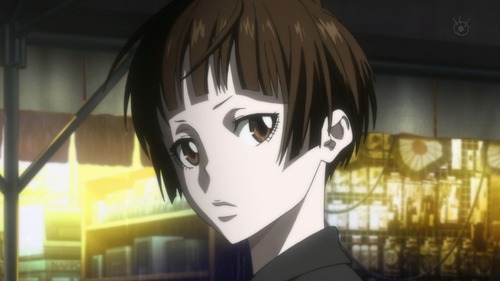
Psycho-Pass as the anti-Madoka, and why an anticlimactic ending isn’t necessarily a bad one, after the break.
Continue reading
Gen Urobuchi, lest you forget where he got the nickname “Urobutcher,” established his name as an anime screenwriter by grinding a cast of largely innocent teenage girls into despair between the cogs of a cruel, unfeeling magical world. Ultimately, Madoka’s title character found a way to destroy that system once and for all, but the deus ex machina nature of the resolution never sat well with me. Madoka’s wish may have been born out of the suffering that she had watched her friends endure, but it also pointed to a lack of imagination on the part of everyone that had contracted before her. The fact that there was nothing keeping another prospective magical girl from making the same wish that Madoka had essentially cheapened the hardship that the characters underwent throughout the series, reducing it to nothing more than emotional window dressing.
Urobuchi’s latest work on Psycho-Pass is by no means flawless, but it does at the very least avoid repeating this mistake of Madoka’s. At first glance, in fact, it seems to commit the opposite error: The Sibyl System that runs Psycho-Pass’ conception of 22nd-century Japan is quite literally built on criminal minds, and yet the series ends with its main characters trying to keep it from being overthrown. The important difference? The Sibyl System, for all its obvious faults, is also more or less the only thing keeping social order, whereas Madoka’s system of magic had no obvious upsides. This nuance gives the internal conflict of Psycho-Pass’ main character, Akane, necessary weight – she knows on the one hand that Sibyl’s micromanagement of citizens’ lives is untenable, but at the same time knows that those selfsame lives would likely be forfeit should it be allowed to fall. Instead of Madoka’s revolutionary ending, then, Psycho-Pass gives us an evolutionary one; as Akane puts it, standing in Sibyl’s central chamber in the final episode, “We’re always aiming for a better society. One day, someone will come to this room to turn off the power. We will find a new path. You can count on it,” and indeed Akane’s progression as a character over the course of the series shows that perhaps she’s ready to do just that. Psycho-Pass recognizes that dystopia cannot simply be waved away, and it is for this reason that its conclusion, understated as it is, sits better with me than Madoka’s finale ever did.